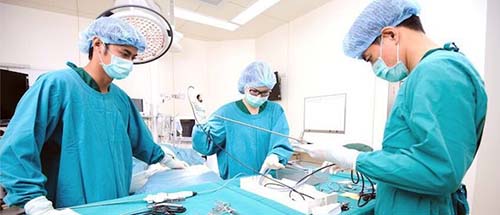
Surgical technologists work in outpatient surgical centers, dental facilities, and hospitals. Depending on their specific role or experience, a tech can perform essential duties that need to be carried out prior to, during or after a surgical procedure. Regardless, the tech will always be involved in working alongside a surgeon and anticipating their needs while also providing quality patient care.
Typically there are three main roles a tech is able to perform; scrub tech, second assisting tech, and circulating tech. Each of these positions will correspond with different sets of tasks which can overlap at times.
Basic Tasks for the Surgical Tech
Surgical techs have a number of responsibilities which can include checking supplies for each operating room and restocking as needed, setting up trays with surgical instruments, medications and equipment, prepping sterile scrubs, passing surgical instruments to the physician during a procedure, disinfecting operating rooms before and after procedures, applying electro-surgical grounding pads and tourniquets, securing or changing dressings and transferring patients to and from the operating room.
The difference between an assistant and technician is that the assistant will need to have a more advanced level of training. With additional education, techs can advance to the position of first assistant. The assistant is also qualified to perform the same tasks as the tech and is also trained to perform advanced tasks under the supervision of a surgeon.
Most surgical technologist jobs are found in hospitals, with the operating room being the common environment. However, techs can also work in labor and delivery departments.
Working in this position can be very demanding physically, as the tech needs to constantly remain on their feet and be alert at all times. This can also be considered a high stress position as not properly maintaining a sterilized environment can lead to complications or fatal infections for the patient.
Regardless of the many challenges for this position, techs will also experience several upsides such as working as part of a surgical team and enjoying job security and financial stability.
Salary for the Surgical Technician

The salary you make in this position will vary significantly and will depend on such factors as level of education, work experience and geographic location. Many of these jobs will come with excellent benefits such as paid sick lead, vacations and health insurance. Currently, the bottom ten percent in this field will make around $39,000 a year, while the average median surgical tech salary will range from $43,500 to $49,800. The top earning ten percent of techs will make $55,000 a year or more.
While most of these positions are found in hospitals, there are other work environments that can offer a higher salary, for a tech that has significant experience. The salary will generally increase for the seasoned tech who specializes in a particular area of surgery and who finds employment through outpatient care centers.
The requirements for working in this position can be slightly confusing considering that several states have either passed or plan to pass legislation that will require a new tech to become certified through an accredited organization or register with the state. In many states the certification for this profession is voluntary; however, the majority of employers will prefer to hire only the technicians that have certification.
Programs for technicians can be found through hospitals that will pay for the employees training and certification in exchange for the employee signing an employment contract for a period of one to two years. Often, hospitals will also provide free continuing education courses, seminars and lectures in order to provide the required amount of continuing education credits that are needed in order to renew the surgical technician’s license every two years.
Different Technician Positions and Annual Salaries
A surgical tech will assist the surgeon or nurse with surgical procedures and can also be responsible for handling and setting up medical instruments, prepping patients and transporting them to the operating room. Other tasks will include checking a patient’s chart for accuracy, cleaning and setting up operating rooms and completing written reports regarding procedures.
The majority of techs will have completed an associate’s degree or certificate program, in order to obtain a deeper understanding of basic surgical procedures. Techs are also able to choose specific types of surgery to specialize in. Having a specialty can mean additional education programs and a higher annual salary. Typically the annual income for this position can range from $43,900 to $47,200.
Certified techs will have completed additional training and taken the certification exam through an accredited surgical technology organization.
The main task for this position is to provide assistance to healthcare professionals during medical procedures and prevent hemorrhages, while meeting the needs of the supervising surgeon. The annual surgical technician salary for this position can range from $44,500 to $52,300.

A circulating tech will deal primarily with the patient care that takes place out of the operating room. These techs work by interviewing patients before procedures and obtaining their personal medical history and they will also take down the written account of what happens during a surgical procedure. The surgical technologist salary for this position will range from 29,000$ to 36,000$ a year.
A Higher Paying Work Environment
While the majority of techs find employment through hospitals, one of the higher paying work environments can be found in out-patient centers. In order to land a position in this type of facility the tech will need to have a minimum of three years of work experience as a tech and have valid certification.
To increase your chances of finding employment you can also obtain certification as a sterile processing technician, which will also help to increase your hourly rate.
The certificate programs for the processing tech can take six to twelve months to complete and will feature many of the same courses as the surgical tech programs.
The surgical tech certification process will require the completion of an accredited certificate program and taking the certification exam that’s administered by the NBSTSA. Becoming a surgical tech obviously requires dedication and determination.
Certificate programs for this career field will provide an introduction to the responsibilities and duties of the surgical tech. Here we take a look at program enrollment requirements, the courses that are included and we also take a look at the job outlook and continuing education requirements for this position.
What you can expect from a Certificate Program
Certificate programs for surgical technology will prepare a student to work as a professional surgical tech. The coursework included will focus on procedures that take place before surgeries and outline the duties involved such as prepping the patient, stocking the operating room and escorting the patients to the surgery.
Surgical tech schools and community colleges that offer this type of program will typically have affiliations with local hospitals or surgical centers. The student enrolled in this program will gain supervised, practical and assisting experience in a real healthcare setting. Some technician programs can be completed in nine to twelve months, while the degree programs that are available can take two years.
The requirements for program entry can vary. Typically most schools require students to have a high school diploma or GED and be a minimum age of 17. Community colleges might require the student to have a background in microbiology, physiology or human anatomy before they are eligible for admission. Often statements of purpose can be required and should indicate the applicant’s reasons why they are seeking admission into a surgical technology program.
Courses for the program will cover all the aspects of assisting protocol and the pre and post-surgical procedures. Core classes for the program will include such topics as medical terminology, the fundamentals of surgical technology, basic pharmacology, common practices in the operating room and biology.
Internships and the Certification Process
During a program a student will be required to participate in an internship that will be held at a local hospital or surgical center. During the internship the student will be able to gain hands on experience, working alongside professional technicians while also observing surgical procedures.
Students will learn how to properly clean and disinfect operating rooms, stock them and take inventory of medical instruments, supplies and equipment. The professional tech will also teach the intern how to test the medical equipment that’s going to be used in a procedure as well as how to calibrate certain equipment and what to do if they notice the equipment is not functioning correctly.
In order for the student to obtain surgical tech certification, they will need to successfully complete a program and pass the certification exam that’s offered by an accredited organization. Only the graduates that have completed certificate programs that are recognized by these accredited agencies will be eligible for the exam.
The techs that pass the test will be certified for a four year period and will need to obtain a determined amount of continuing education hours in order to qualify for license renewal.





